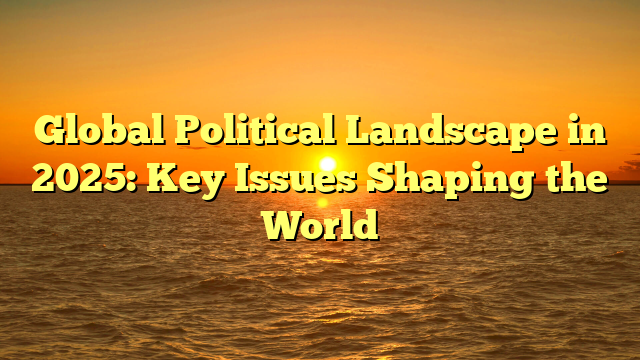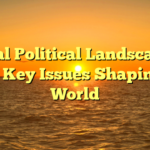As 2025 unfolds, the world is experiencing significant political changes that are reshaping international relations, economic policies, and domestic governance. From high-stakes elections to diplomatic tensions and policy shifts, political developments in major nations are setting the tone for the future. This article examines some of the most pressing political events and trends that are shaping global affairs.
The U.S. Bayar4D Alternatif : A Defining Election
One of the most closely watched political events of 2025 is the U.S. presidential election. With economic recovery, immigration, healthcare, and foreign policy at the center of political debates, both major parties are presenting their visions for the country’s future.
The incumbent administration is emphasizing economic stability, job creation, and climate policies, while opposition candidates are pushing for tax reforms, stricter immigration laws, and shifts in foreign relations. The role of independent and third-party candidates is also growing, reflecting public frustration with traditional political structures.
Voter turnout will be a crucial factor in determining the election outcome, with key battleground states likely to play a decisive role. As the world watches, the results of the U.S. election will have significant implications for global diplomacy and economic policies.
Europe: Rising Nationalism and Economic Challenges
Across Europe, nationalist movements are gaining momentum, driven by concerns over immigration, economic instability, and energy security. Countries such as France, Germany, and Italy are witnessing political shifts as leaders respond to growing public demands for stronger national policies.
Germany, the EU’s largest economy, is focusing on strengthening its defense strategy and energy independence, particularly in response to geopolitical tensions in Eastern Europe. France, on the other hand, is navigating political divisions as upcoming elections test the popularity of centrist and far-right candidates.
The European Union itself is facing internal challenges, with debates over economic policies, climate regulations, and digital governance creating divisions among member states. The outcome of these political shifts will determine the future of the EU’s unity and global influence.
China’s Strategic Expansion and Global Influence
China continues to play a major role in global politics, with its economic and diplomatic strategies shaping international relations. The country’s Belt and Road Initiative (BRI) is expanding into new regions, strengthening China’s influence in Asia, Africa, and Latin America.
However, tensions between China and Western nations remain high, particularly concerning trade policies, cybersecurity, and military activity in the South China Sea. The Taiwan issue remains a point of contention, with both the U.S. and China increasing military operations in the region.
Despite these challenges, China is also working on diplomatic efforts to improve global relations. Trade agreements, technological collaborations, and climate initiatives are areas where China is seeking to balance competition with cooperation.
The Middle East: Shifting Alliances and Security Concerns
The Middle East remains a politically volatile region, with shifting alliances and ongoing conflicts shaping the political landscape. Iran’s nuclear program continues to be a point of concern for Western nations, leading to renewed negotiations over possible agreements to limit its nuclear activities.
Saudi Arabia and the United Arab Emirates (UAE) are strengthening their economic and technological sectors, aiming to diversify beyond oil. Meanwhile, Israel’s relations with its Arab neighbors are evolving, with diplomatic agreements opening new economic and security collaborations.
Conflicts in Syria and Yemen persist, with international efforts being made to reach peace agreements. The region’s future will depend on how leaders navigate security challenges while working toward economic and political stability.
Africa’s Political and Economic Transformation
Several African nations are experiencing significant political changes, with elections, economic reforms, and diplomatic initiatives shaping the continent’s future. Countries such as Nigeria, Kenya, and South Africa are working to strengthen democratic institutions while addressing challenges such as corruption and economic instability.
The African Union (AU) is playing an increasingly active role in mediating conflicts and promoting regional cooperation. Trade agreements such as the African Continental Free Trade Area (AfCFTA) are boosting economic integration, providing new opportunities for investment and growth.
However, security issues, including terrorism and political instability in regions such as the Sahel, remain obstacles to progress. The ability of African nations to balance governance, security, and economic development will be key to shaping the continent’s trajectory.
Climate Policy: A Global Political Priority
Climate change continues to be a major issue in global politics, with world leaders facing growing pressure to implement effective policies to address environmental challenges. The United Nations Climate Conference has brought countries together to discuss emissions reductions, renewable energy investments, and environmental protection efforts.
While some nations are accelerating their transition to green energy, others face political and economic barriers to achieving climate goals. Developing countries, in particular, are demanding financial and technological support from wealthier nations to implement sustainable solutions.
Private sector initiatives, such as investments in electric vehicles and carbon capture technologies, are playing an increasing role in shaping climate policies. Governments are being pushed to find a balance between economic growth and environmental responsibility.
Conclusion
The political landscape of 2025 is defined by major elections, economic policies, and geopolitical tensions. As the world navigates these challenges, the decisions made by political leaders will shape international relations, economic stability, and climate efforts for years to come.
From the U.S. presidential election to China’s global influence and Europe’s political shifts, the world is undergoing rapid transformations. In an era of uncertainty, diplomacy, cooperation, and strategic policymaking will be critical in determining the future of global politics.
Global Political Landscape in 2025: Key Issues Shaping the World










